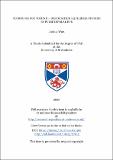To bind or not to bind - dissociation equilibria studied by pulse dipolar EPR
Date
15/06/2022Author
Supervisor
Funder
Metadata
Show full item recordAltmetrics Handle Statistics
Altmetrics DOI Statistics
Abstract
Pulse dipolar EPR is an appealing strategy for structural characterisation of complex systems in solution that complements other biophysical techniques. Significantly, the emergence of genetically encoded self-assembling spin labels exploiting exogenously introduced double-histidine motifs in conjunction with Cull chelates offers high precision distance determination in systems non-permissive to thiol- directed spin labelling. However, the non‐covalent CuII coordination approach is vulnerable to low binding‐affinity. Here, an approach is outlined where dissociation constants (KD) are investigated directly from the modulation depths of relaxation‐induced dipolar modulation enhancement (RIDME) EPR experiments applied to the model protein Streptococcus sp. group G. protein G, B1 domain (GB1). This reveals low‐ to sub‐μM CuII-chelate KDS under RIDME conditions at cryogenic temperatures. We show the feasibility of exploiting the double‐histidine motif for EPR applications even at sub‐μM protein concentrations in orthogonally labelled CuII–nitroxide systems.
Additionally, modulation depth quantitation in CuII–CuII RIDME to simultaneously estimate a pair of non- identical independent KDS is addressed. Furthermore, we develop a general speciation model to optimise CuII labelling efficiency, depending upon pairs of identical or disparate KDS and total label concentration. We find the KD estimates are in excellent agreement with previously determined values. We also investigated the vulnerability of binding to both competition from adventitious divalent metal ions, and pH sensitivity. A combination of room-temperature isothermal titration calorimetry (ITC) and CuII-nitroxide RIDME measurements are applied to GB1. Results demonstrate double-histidine spin labelling using CuII-nitrilotriacetic acid (CuII-NTA) is robust against the competitor ligand ZnII-NTA at >1000-fold excess, and high nM binding affinity is retained at acidic and basic pH, despite room-
temperature behaviour suggesting a stronger dependence.
.
Type
Thesis, PhD Doctor of Philosophy
Collections
Description of related resources
To Bind or Not to Bind - Dissociation Equilibria Studied by Pulse Dipolar EPR (thesis data) Wort, J., University of St Andrews, 11 May 2023. DOI: https://doi.org/10.17630/ec8eef86-099d-4a1b-8a0d-814a997f352dRelated resources
https://doi.org/10.17630/ec8eef86-099d-4a1b-8a0d-814a997f352dItems in the St Andrews Research Repository are protected by copyright, with all rights reserved, unless otherwise indicated.

